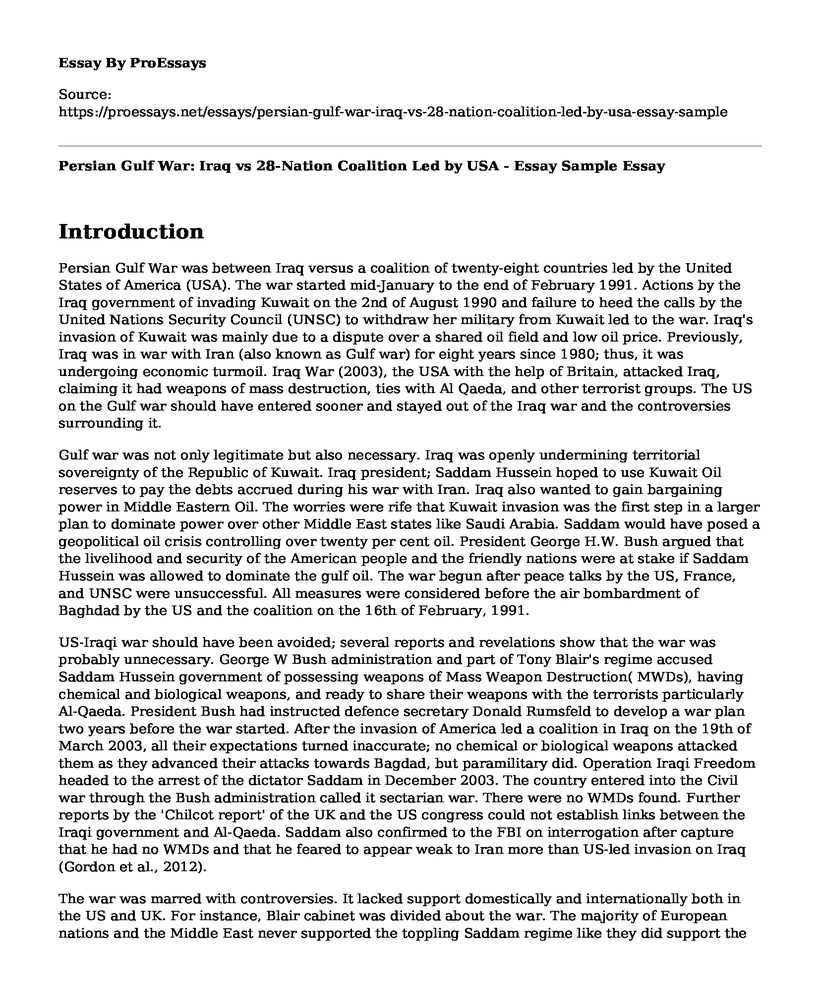Introduction
Persian Gulf War was between Iraq versus a coalition of twenty-eight countries led by the United States of America (USA). The war started mid-January to the end of February 1991. Actions by the Iraq government of invading Kuwait on the 2nd of August 1990 and failure to heed the calls by the United Nations Security Council (UNSC) to withdraw her military from Kuwait led to the war. Iraq's invasion of Kuwait was mainly due to a dispute over a shared oil field and low oil price. Previously, Iraq was in war with Iran (also known as Gulf war) for eight years since 1980; thus, it was undergoing economic turmoil. Iraq War (2003), the USA with the help of Britain, attacked Iraq, claiming it had weapons of mass destruction, ties with Al Qaeda, and other terrorist groups. The US on the Gulf war should have entered sooner and stayed out of the Iraq war and the controversies surrounding it.
Gulf war was not only legitimate but also necessary. Iraq was openly undermining territorial sovereignty of the Republic of Kuwait. Iraq president; Saddam Hussein hoped to use Kuwait Oil reserves to pay the debts accrued during his war with Iran. Iraq also wanted to gain bargaining power in Middle Eastern Oil. The worries were rife that Kuwait invasion was the first step in a larger plan to dominate power over other Middle East states like Saudi Arabia. Saddam would have posed a geopolitical oil crisis controlling over twenty per cent oil. President George H.W. Bush argued that the livelihood and security of the American people and the friendly nations were at stake if Saddam Hussein was allowed to dominate the gulf oil. The war begun after peace talks by the US, France, and UNSC were unsuccessful. All measures were considered before the air bombardment of Baghdad by the US and the coalition on the 16th of February, 1991.
US-Iraqi war should have been avoided; several reports and revelations show that the war was probably unnecessary. George W Bush administration and part of Tony Blair's regime accused Saddam Hussein government of possessing weapons of Mass Weapon Destruction( MWDs), having chemical and biological weapons, and ready to share their weapons with the terrorists particularly Al-Qaeda. President Bush had instructed defence secretary Donald Rumsfeld to develop a war plan two years before the war started. After the invasion of America led a coalition in Iraq on the 19th of March 2003, all their expectations turned inaccurate; no chemical or biological weapons attacked them as they advanced their attacks towards Bagdad, but paramilitary did. Operation Iraqi Freedom headed to the arrest of the dictator Saddam in December 2003. The country entered into the Civil war through the Bush administration called it sectarian war. There were no WMDs found. Further reports by the 'Chilcot report' of the UK and the US congress could not establish links between the Iraqi government and Al-Qaeda. Saddam also confirmed to the FBI on interrogation after capture that he had no WMDs and that he feared to appear weak to Iran more than US-led invasion on Iraq (Gordon et al., 2012).
The war was marred with controversies. It lacked support domestically and internationally both in the US and UK. For instance, Blair cabinet was divided about the war. The majority of European nations and the Middle East never supported the toppling Saddam regime like they did support the Gulf war. Blair and Bush were ready to go to war even without approval by UNSC.
The Gulf war known as Desert Storm was necessary and legitimate, while the US-Iraqi war seemed to be pushed by ulterior motives. All the reasons given for the war were not sufficient to warrant a fight. Peaceful options should have been considered and exhausted. The war impact is still felt in Iraq due to the emergence of insurgencies like ISIL after the collapse of the Bagdad Regime of Saddam Hussein.
Work Cited
Gordon, Michael R., and Bernard E. Trainor. The endgame: The inside story of the struggle for Iraq, from George W. Bush to Barack Obama. Pantheon, 2012.
Cite this page
Persian Gulf War: Iraq vs 28-Nation Coalition Led by USA - Essay Sample. (2023, Aug 10). Retrieved from https://proessays.net/essays/persian-gulf-war-iraq-vs-28-nation-coalition-led-by-usa-essay-sample
If you are the original author of this essay and no longer wish to have it published on the ProEssays website, please click below to request its removal:
- Auguste Rodin Artistic Context and Biography Essay
- Compare and Contrast Essay on Paul Revere From the Movie Sons of Liberty and Real Life
- 1920s US Economy: Uneven Fortune, Low Wages, and Political Anxiety - Essay Sample
- Division of Law: Greek Society's Slaves vs. Free People - Essay Sample
- Essay Example on Friedrich Nietzsche: Radical Aristocrat, Poet & Prophet
- Essay Sample on Unveiling the Mysteries of Homo Sapiens: Brain Size & Skull Shape
- Report Sample on Bill Gates' Epic Speech: 'The Next Outbreak'







